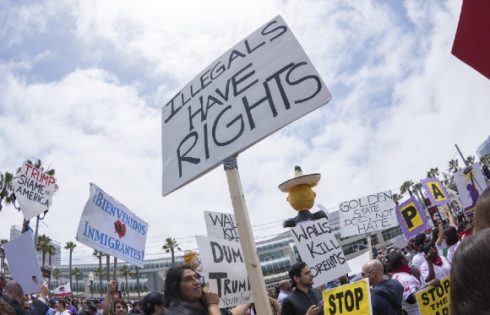
In a Thursday Philadelphia Inquirer op-ed, Susquehanna University President L. Jay Lemons perfectly exemplifies the point I made a month ago about political correctness.
“There has been a lot of talk in recent weeks about ‘political correctness,'” he writes, “particularly among our presidential candidates. Donald Trump doesn’t have time for it. Ben Carson thinks it’s ‘ruining our country.’”
“They and many others resent being criticized for intolerance and discrimination. Yet they twist the term political correctness to denigrate critics and excuse their own behavior disparaging another’s race, gender, or national origin.”
You can think what you want about some of the top two GOP candidates’ comments (for what it’s worth, personally, I think the former crossed a line with his (in)famous comments about Mexicans), but here we see yet again an academician completely ignoring what actually irritates people about political correctness (and which most probably accounts for much of Trump’s and Carson’s current popularity).
Lemons’ personal example? His school’s mascot, the Crusader. Uh oh!
For the past six weeks I’ve been on the road, gathering input on the Crusader nickname and mascot from students, faculty, staff, and alumni. As you might guess, folks came down on both sides of the issue. Some feel a loyalty to the tradition associated with Crusader and want to own and define the term in light of its origins here. Others felt that the Crusader nickname has negative connotations that are at odds with our university’s values and commitment to diversity and inclusiveness.
Both those feelings are valid, but I bristle at the critics who have suggested that we are bowing to political correctness by even bringing this issue to debate. It seems it’s easier than ever these days to rise up and rail against political correctness. Used as a justification, insult, or outright dismissal, it prevents difficult issues from being treated with the complexity they deserve. To pride oneself — as some of those presidential candidates do — on opposing “political correctness” is to stubbornly insist on the right to trivialize issues that may affect others’ lives.
Here’s the kicker: The origin of Susquehanna’s nickname didn’t even have anything to do with the ancient battles for the Holy Land. It refers to a former athletic director’s “‘crusade’ to bring integrity to intercollegiate athletics.” This was back in 1924.
 Not to mention, the college already changed its mascot from a typical medieval knight to the Caped Crusader, “an orange tiger in a maroon cape.” They did this back in the 1990s.
Not to mention, the college already changed its mascot from a typical medieval knight to the Caped Crusader, “an orange tiger in a maroon cape.” They did this back in the 1990s.
So … who is offended by what, exactly?
Lemons says that “[Some] felt that the Crusader nickname has negative connotations that are at odds with our university’s values and commitment to diversity and inclusiveness,” and he “bristles” at the suggestion that it is PC to even have a debate about the name/mascot.
Has anyone, Lemons included, actually brought up the real origin of the school’s name in these discussions? That its mascot has been an animal for around 20 years?
Don’t these matter? Aren’t they significant?
Nevertheless, what about the feelings of those who do believe that political correctness is out of control? Isn’t Lemons trivializing issues that may affect them?
Yes he is. And this is the knot into which rabid PCers frequently tie themselves.
I’d ask President Lemons if referring to the following instances as politically correct are “insults” and “outright dismissals” … and if they “prevent difficult issues from being treated with the complexity they deserve”:
— referring to supporters of Thomas Jefferson as “defending slave owners” and accusing them of “white privilege”
— ditching a career fair booth for the Border Patrol because it might offend “students in the country illegally”
— black dildos are proof of racism
— a “mad scientist”-themed college party was deemed offensive
— a college “language guide” advises against using terms like “mailman,” “policeman,” and “man-made”
— saying “emotional injury” is sufficient to prohibit “unpopular” speech
— complaining about a Mexican-themed event so much so that it gets canned, but other similar events didn’t bother you?
— using a non-existent “racist” event to advocate for $1 million for more … diversity
— and, most recently, wbanning anything USA/Donald Trump-related, not to mention the colors red, hite and blue … because of “negative connotations.”
Lemons continues, saying he is “wary of any suggestion that we limit the discussion of challenging, or even disturbing, ideas; topics that are disturbing or difficult often require the most discussion.”
He adds that he “can think of no better place for such debates and discussion than the college campus.”
Really? Where have you been, sir? It is not anti-PC conservatives like Mr. Trump and Dr. Carson who are thwarting discussions at universities. It is the progressive left which is largely responsible for this.
And, as if on cue, there is now a college seeking to make very term “politically correct” verboten:
The phrase “politically correct” is now a microaggression according to the University of Wisconsin-Milwaukee.
The university’s “Just Words” campaign is the work of UWM’s “Inclusive Excellence Center” and aims to “raise awareness of microaggressions and their impact”—microaggressions like “politically correct” or “PC.”
Merriam-Webster defines “politically correct” as “conforming to a belief that language and practices which could offend political sensibilities (as in matters of sex or race) should be eliminated.” The university, however, claims that calling something “politically correct” “has become a way to deflect, [and say] that people are being too ‘sensitive’ and police language.” “Politically correct,” moreover, is just one of a whole host of words and phrases the university has denounced as microaggressions.
Does or does not that last sentence sound just like President Lemons’ complaint?
It does, of course. But, hopefully, Susquehanna’s chief (pardon the microaggression) is sincere about his desire not to limit discussions and debate.
Like The College Fix on Facebook / Follow us on Twitter
IMAGES: Shutterstock







Please join the conversation about our stories on Facebook, Twitter, Instagram, Reddit, MeWe, Rumble, Gab, Minds and Gettr.